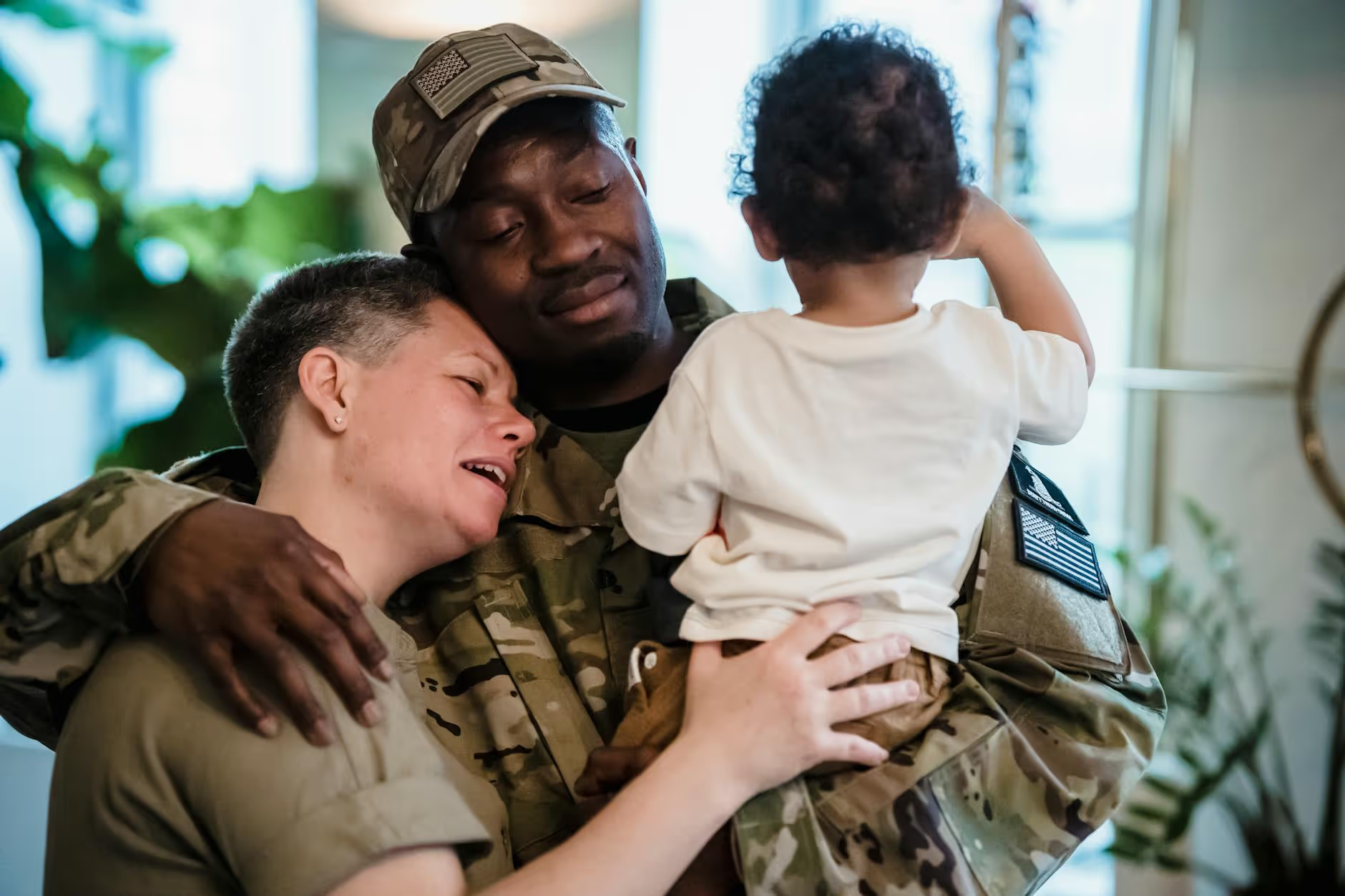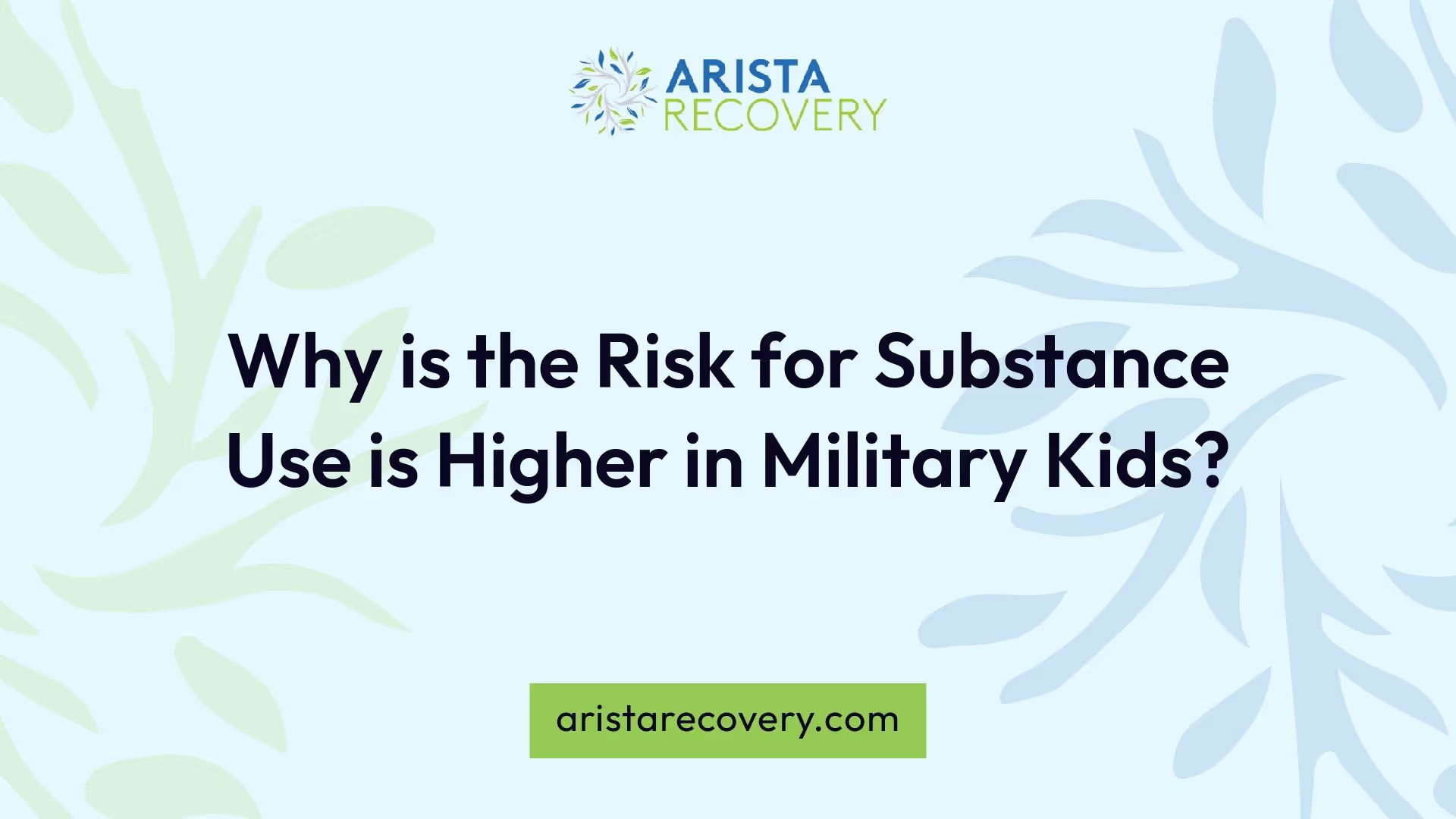
Risk Factors for Substance Use
Challenges Faced by Military Kids
Military kids face unique challenges that can contribute to a higher risk for substance use compared to their civilian peers. Factors such as frequent relocations, parental deployments, and exposure to substance use within military communities create an environment that may increase vulnerability to addiction.

A study indicates that children of currently or recently deployed parents in the military show notable differences in substance use rates. These children are more likely to engage in various forms of substance use, such as alcohol and illicit drugs, when compared to children of non-military parents.
Substance Use TypeRelative Risk (RD)Alcohol Use7.85Binge Drinking8.02Marijuana Use5.30Other Illegal Drug Use7.10Prescription Drug Misuse8.58
These findings show that military children aged 12 to 17 are significantly more likely to have used alcohol, tobacco, or illicit drugs in the past month (Attain Behavioral Health). The data demonstrates that the risk persists across different educational levels, including 6th, 8th, and 11th grades (PubMed).
The unique stressors associated with a military lifestyle, including the emotional strain of parental deployments, can also lead to increased rates of child maltreatment within military families. Deployment introduces a heightened level of uncertainty that can compel children to seek comfort or escape through substance use.
In summary, the challenges that military kids encounter significantly contribute to the increased risk for substance use, making it imperative to understand these factors in the context of addiction and prevention efforts.
Research Findings
Substance Use Rates in Military Kids
Research confirms that the risk for substance use is significantly higher in military kids when compared to their civilian peers. Various studies illustrate alarming statistics that highlight this vulnerability. Specifically, military children aged 12 to 17 are more inclined to consume alcohol, tobacco, or illicit drugs within the past month.
The following table summarizes key findings regarding substance use rates among military kids relative to civilian children:
Substance TypeRisk Difference (RD)DescriptionAlcohol Use7.85Higher rates of alcohol consumption among military kids compared to non-military kids.Binge Drinking8.02Increased likelihood of binge drinking behaviors.Marijuana Use5.30Military children show higher rates of marijuana use.Other Illegal Drug Use7.10Elevated risk of using other illegal substances.Prescription Drug Misuse8.58Significant risk of misuse of prescribed medications.
These statistics, drawn from research, suggest that challenges stemming from the military lifestyle—such as frequent relocations and parental deployments—contribute substantially to these higher rates PubMed.
The increased vulnerability across different educational levels (6th, 8th, and 11th grades) demonstrates that these trends persist, indicating a consistent pattern within military communities PubMed. Additionally, factors like exposure to substance use within military environments further exacerbate the situation Attain Behavioral Health.
Understanding these findings is crucial for developing effective intervention strategies, acknowledging the unique challenges faced by military kids, and emphasizing the importance of supportive networks Social Recovery Center.
Contributing Factors
Understanding the contributing factors to substance use among military kids is essential to addressing their higher vulnerability. Two significant aspects of this issue are the impact of the military lifestyle and exposure to stressors and trauma.
Impact of Military Lifestyle
The unique challenges associated with military life significantly contribute to the increased risk for substance use among military kids. Frequent relocations disrupt social connections and support systems. These moves can lead to feelings of isolation and insecurity, which may prompt some children to seek relief through substance use.
Research indicates that children of currently or recently deployed parents have higher rates of substance use compared to their peers. The relative risks (RD) for various substances among these children are outlined below:
SubstanceRelative Risk (RD)Alcohol Use7.85Binge Drinking8.02Marijuana Use5.30Other Illegal Drugs7.10Prescription Drug Misuse8.58
These statistics demonstrate the consistency of elevated rates of substance use across different grade levels, emphasizing the ongoing vulnerability faced by these children.
Stressors and Trauma Exposure
Stressors and trauma exposure play a critical role in the increased risk of substance use among children in military families. Deployment creates a unique set of challenges, including anxiety about a parent's safety and the emotional toll of separation. Studies reveal that children experiencing deployment are significantly more likely to engage in various forms of substance use, such as binge drinking and illegal drug use, than their nonmilitary peers.
Furthermore, military communities may have higher visibility of substance use behaviors, which can normalize these activities for children. This exposure can contribute to a culture where substance use is seen as an acceptable coping mechanism in response to the unique stresses of military life (Attain Behavioral Health).
In summary, the combination of a challenging military lifestyle and significant stressors, including trauma exposure, significantly increases the susceptibility of military kids to substance use. Addressing these factors is crucial in developing effective prevention and intervention strategies.
Prevention Strategies
Preventing substance use among military kids involves a multi-faceted approach that addresses the unique challenges these children face. Effective interventions and strong family support play vital roles in fostering resilience and reducing vulnerability to substance use.
Developing Effective Interventions
To combat the heightened risk for substance use in military children, it is essential to develop effective interventions tailored to their specific needs. Factors contributing to their increased risk include the distinct challenges of military life, such as frequent relocations, parental deployments, and exposure to substance use within military communities (Attain Behavioral Health).
Successful strategies could include:
Importance of Family Support
Family support is crucial for promoting the well-being of military children. Strong family relationships can mitigate stress and anxiety, thereby reducing the likelihood of substance use.
Key ways families can provide this support include:
By developing effective interventions and reinforcing the importance of family support, the risk for substance use can be significantly lowered in military children, creating a healthier, more resilient generation.
Seeking Help
Addressing substance use vulnerabilities in military kids requires proactive measures, including professional assistance and early intervention measures. Both strategies are essential in fostering resilience and promoting healthier outcomes for these children.
Professional Assistance
Professional assistance plays a vital role in supporting military children who may be facing challenges related to substance use. Mental health professionals can provide tailored strategies to help navigate the unique pressures that come with a military lifestyle. They can offer a range of therapies designed to address issues such as stress, anxiety, and behavioral changes, which are often associated with a higher risk for substance use in military kids.
Research indicates that children with deployed parents are significantly more likely to report engaging in behaviors like binge drinking and substance use. Professional support can help these children develop healthier coping mechanisms and build skills to manage their emotions and situations more effectively.
Type of Professional AssistanceDescriptionCounselingIndividual or group sessions focusing on coping strategies and emotional support.Substance Use TreatmentSpecialized programs for adolescents dealing with substance-related issues.Family TherapyInvolves the entire family to address dynamics and improve communication.School-Based ProgramsSupport services within schools to provide immediate help and resources.
Early Intervention Measures
Recognizing changes in behavior can facilitate early intervention for military kids susceptible to substance-related issues. Changes in academic performance, social interactions, or emotional well-being can be indicators of deeper issues that may require attention.
Taking proactive steps early can make a significant difference in outcomes for these children, potentially preventing the escalation of substance use problems. Here are some key early intervention measures:
Early Intervention MeasureDescriptionBehavior MonitoringRegularly assessing changes in behavior, mood, and social interactions.Open CommunicationEncouraging ongoing discussions about feelings and challenges between parents and children.School InvolvementCollaborating with teachers and school counselors to monitor academic and emotional health.Community ResourcesUtilizing community support groups and programs designed for military families.
Strong family support is essential in promoting well-being among military children, as it can help mitigate stress and anxiety. By fostering supportive environments and utilizing professional assistance and early intervention measures, families can help reduce the likelihood of substance use issues among military kids.
When mental health challenges and addiction intersect, it can feel isolating. At Arista, we offer compassionate, evidence-based, and trauma-informed care to help you heal, grow, and move forward.
Why is the Risk for Substance Use is Higher in Military Kids?
You’re not alone in this.
When mental health challenges and addiction intersect, it can feel isolating. At Arista, we offer compassionate, evidence-based, and trauma-informed care to help you heal, grow, and move forward.
Support that moves with you.
You’ve taken a brave first step. At Arista Recovery, we’re here to help you continue with best-in-class care designed for long-term healing and support.
.webp)






